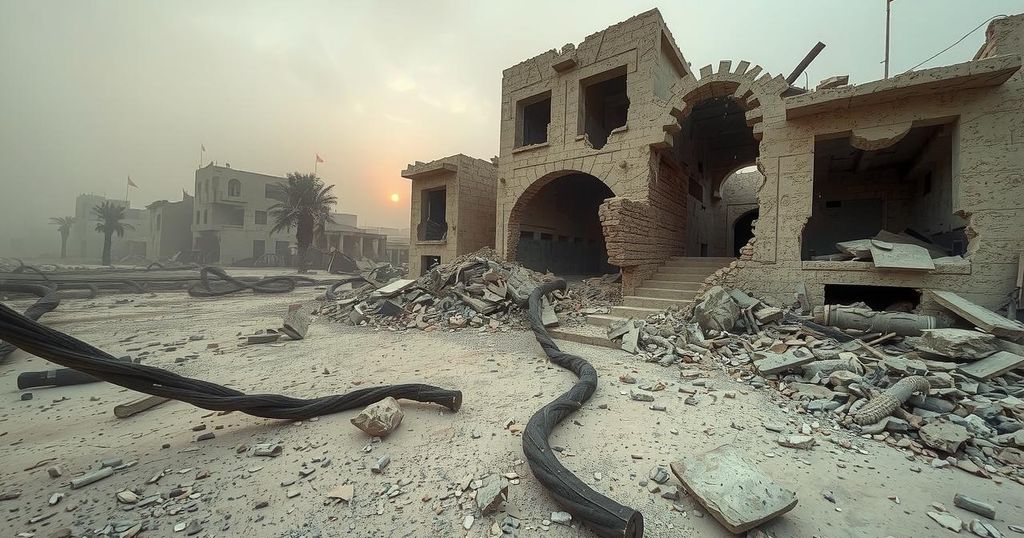The Syrian Army has launched an offensive against Hezbollah near the Lebanon border amid rising tensions with Tehran’s proxies. With a focus on reclaiming strategic areas and controlling borders, the clashes have resulted in casualties for both groups and signify a shift in Syria’s policy towards Iranian influence. The new Syrian administration aims to restore sovereignty and diminish Hezbollah’s operations, potentially weakening Tehran’s regional power.
The Syrian Army has initiated a comprehensive military operation aimed at expelling Hezbollah militants from critical border areas adjacent to Lebanon. This operation denotes a notable increase in tensions between the Syrian government in Damascus and Iran’s military proxies. According to various news outlets such as Al Arabiya and Sky News Arabia, these clashes have led to casualties for both involved parties and heightened cooperation between Syrian and Lebanese security forces against Hezbollah.
Heavy fighting has erupted in the town of Hosh Al-Sayyid Ali, a strategic area held by Hezbollah since 2013. Reports indicate that the Syrian Army has launched a persistent artillery and missile campaign against Hezbollah positions in the region. A spokesperson from the Syrian defense ministry communicated through state media that the objective is to “completely retake the town” and secure the border against Hezbollah’s activities, including arms smuggling and trafficking.
Additionally, Sky News Arabia highlighted a statement from a Syrian Ministry of Defense official that asserted the Syrian Army’s close collaboration with Lebanese forces to secure the border. The Lebanese Army’s retaliation against Hezbollah attacks suggests growing tensions even among Lebanon’s erstwhile allies. A military source from Lebanon stated, “Our forces have been ordered to respond to any attacks from Syrian territory.”
In retaliation to Syrian advances, Hezbollah fighters reportedly launched rocket strikes towards Syrian positions near Homs. Consequently, the Syrian forces escalated their offensive, causing Hezbollah to withdraw from several locations. Sources maintain that Hezbollah suffered considerable losses, with claims of at least 12 Hezbollah fighters and 8 Syrian soldiers killed during the ongoing conflict.
The renewed clashes along the Lebanon-Syria border represent a significant turning point in Syria’s approach toward Iranian influence. Hezbollah has long served as Iran’s foremost military proxy in the region, crucial for extending Tehran’s influence throughout Syria. However, the recent administration under President Ahmed al-Sharaa is striving to redefine this relationship. Syrian officials assert their commitment to “restore full control” over national borders and curb Hezbollah’s unauthorized activities, indicating a move toward regaining sovereignty and minimizing external meddling.
This evolving situation directly undermines Iran’s regional strategy, as Hezbollah’s potential loss of strategic footholds in Syria could significantly weaken Tehran’s so-called ‘Axis of Resistance’ against Western and Arab forces. Moreover, Hezbollah’s military setbacks may galvanize domestic opposition within Lebanon, consequently diminishing Iran’s sway in the region. The developments suggest a deepening rift within the Iran-led alliance, as Damascus emphasizes national interests over Tehran’s expansionist objectives, placing Hezbollah at risk of further isolation amid military pressures from both Syrian and Lebanese forces.
In summary, the Syrian Army’s recent military offensive against Hezbollah reflects a significant shift in Syria’s stance regarding Iranian influence within its borders. The operation has escalated tensions, resulting in casualties on both sides while highlighting a lack of cohesion in the Iran-led alliance. As Syria seeks to reassert its sovereignty and reduce foreign interference, Hezbollah’s position in the region is increasingly jeopardized, potentially impacting Iran’s broader strategic ambitions.
Original Source: www.ncr-iran.org




